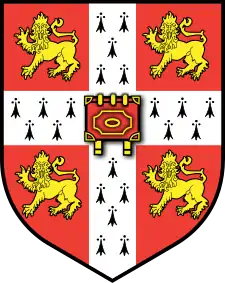Cambridge University Musical Society
The Cambridge University Musical Society (CUMS) is a federation of the university's main orchestral and choral ensembles, which cumulatively put on a substantial concert season during the university term.
Background
Music has a long history at Cambridge. In 1464 the world’s first firmly-authenticated Bachelor of Music degree was awarded at Cambridge to Henry Abyngdon, Master of the Children of the Chapel Royal to Edward IV. Over the intervening centuries celebrated musicians such as William Boyce, William Sterndale Bennett, Charles Villiers Stanford, Ralph Vaughan Williams, Arthur Bliss, Alexander Goehr, Robin Holloway and Thomas Adès have studied or taught at Cambridge.
Foundation
In 1843 the Cambridge University Musical Society (CUMS) was established,[1] and was originally called the Peterhouse Musical Society as most of its members were originally undergraduates from that college.[2] The founders of CUMS included John Bacchus Dykes,[3] William Thomson and John A. L. Airey.[4]
Conductors of CUMS
Many respected musical figures have directed the Cambridge University Musical Society, including the following:
Ensembles
Students wishing to join an orchestra are required to audition at the beginning of the academic year. One audition is required for all ensembles, and based on your abilities and preferences, you are allocated a position. Competition for places is variable depending on instrument. Selection is purely on merit, and irrespective of age, standing in the university, or subject being read. At least half, if not more, of the ensembles are made up of students who do not read Music at the University.
Cambridge University Orchestra (CUO)
A full symphony orchestra, consisting of the university's elite instrumental musicians, most of whom either hold university instrumental awards or have been involved in nationally-significant music making, particularly the National Youth Orchestra. The ensemble is conducted by professional conductors, such as Sir Mark Elder, Sir Roger Norrington, and John Wilson.
Cambridge University Sinfonia (CUS)
The second symphony orchestra of CUMS, giving three concerts in the academic year. Conducted by the CUMS Conducting Scholar.
Cambridge University Wind Orchestra (CUWO)
The wind orchestra, conducted by the CUMS Assistant Conductor.
Cambridge University Symphony Chorus (CUSC)
The large choir, conducted by many well-known conductors over the years (see above).
Cambridge University Chamber Choir
A small choir, consisting of the university's elite singers, directed by Martin Ennis and David Lowe.
Cambridge University Lunchtime Concerts
A series of lunchtime recitals, run by a committee of students, supported by CUMS.
Cambridge University Percussion Ensemble
The newest addition to the CUMS family. Run by students.
References
- Lindley, David (2004). Degrees Kelvin: a tale of genius, invention, and tragedy. National Academies Press. p. 21. ISBN 978-0-309-09073-5.
- Gerald Norris (1980): p. 7
- Carroll, Lewis (1997). Edward Wakeling (ed.). Lewis Carroll's diaries: the private journals of Charles Lutwidge Dodgson (Lewis Carroll) : the first complete version of the nine surviving volumes with notes and annotations, Volume 4. Lewis Carroll Society. p. 129. ISBN 978-0-904117-09-7.
- Craik, Alex D. D. (2008). Mr Hopkins' Men: Cambridge Reform and British Mathematics in the 19th Century. Springer Science+Business Media. p. 152. ISBN 978-1-84800-132-9.
- Gerald Norris: Stanford the Cambridge Jubilee and Tchaikovsky, Newton Abbot: David and Charles, 1980 ISBN 0-7153-7856-2
